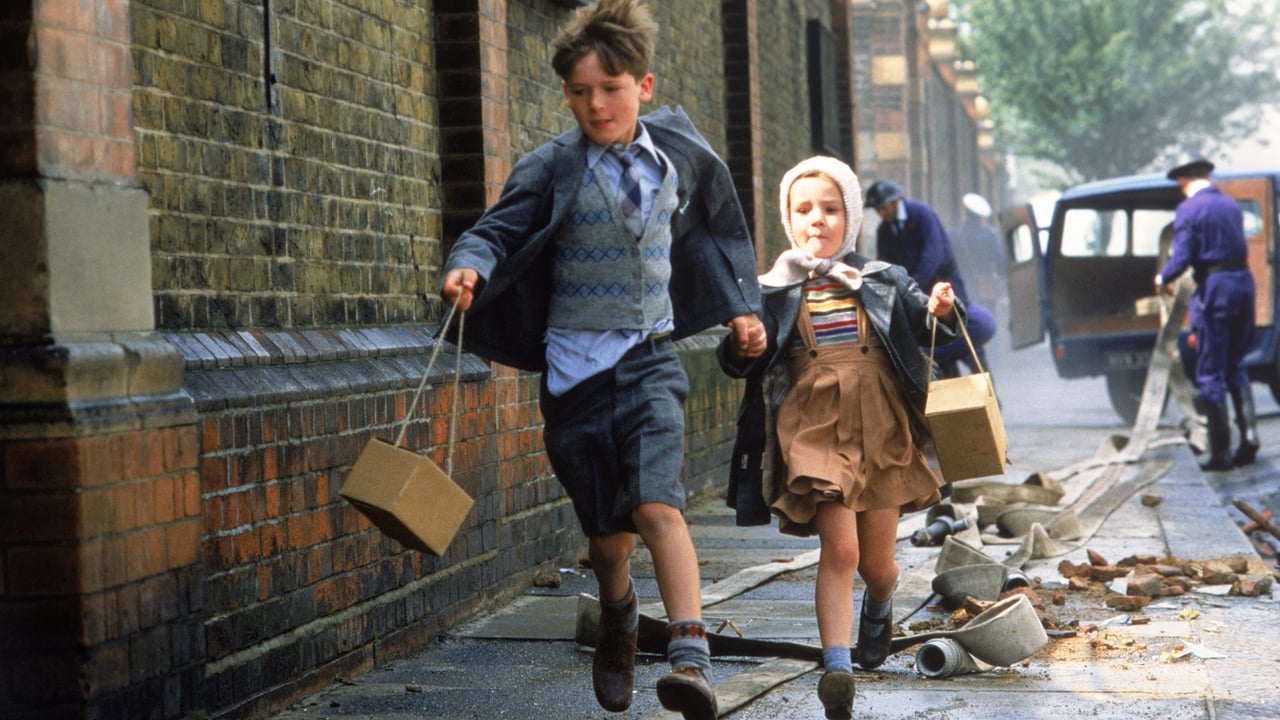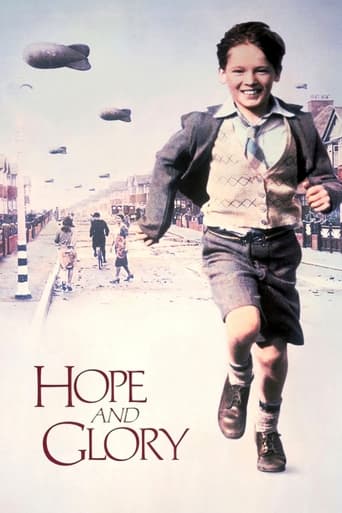

I had missed the opportunity to watch this semi-autobiographical film a few times on television, in 2017 it was celebrating its 30th anniversary, and I was celebrating my 30th birthday, watching it was my to celebrate both occasions, from Oscar, BAFTA and Golden Globe nominated director John Boorman (Point Blank, Deliverance, Exorcist II: The Heretic). Basically it tells the story of the Rohan family: nine-year-old Billy (Sebastian Rice-Edwards), his sisters Sue (Geraldine Muir) and Dawn (Sammi Davis), and his parents Grace (BAFTA nominated Sarah Miles) and Clive (David Hayman), living in a suburb of London. After the broadcast by Prime Minister Neville Chamberlain, announcing the beginning of the Second World War, Clive joins the army, leaving Grace alone to look after the children. The action is seen through the eyes of Billy, the Blitz occurs every night, Billy sees it as the chance for "fireworks, as exciting as they are terrifying, he and his family do not see things in the same way as the bombs continue to drop, the family are brought closer together by their will to survive the nightly raids. Billy learns about sex, death, love, hypocrisy, and the faults of adults, and prowls the ruins of bombed houses on Rosehill Avenue, while his older sister Dawn falls for a Canadian soldier, becomes pregnant, and finds her life turned upside down, but learns the value of family. The family are eventually evacuated, moving to the Thames-side idyllic country home of Grace's parents, Grandfather George (BAFTA nominated Ian Bannen) and Grandma (Annie Leon), Billy's childlike father, who is off chasing patriotic dreams of glory, visits when he can. Billy's mother finds it difficult to cope in these turbulent times, there is an incident where the grandparents' house burns down, not following a raid, an ordinary house fire, but this provides Billy an opportunity to spend more time with his curmudgeonly grandfather. The end of the film sees the family survive the war, the parents and children reunite happily, and Billy is joyful following the end of the Blitz, when Hitler has bombed his school. Also starring Derrick O'Connor as Mac, BAFTA winning Susan Wooldridge as Molly, Jean-Marc Barr as Corporal Bruce Carrey, Jill Baker as Faith, Amelda Brown as Hope, Katrine Boorman as Charity, Charley Boorman as Luftwaffe Pilot and The Man with the Golden Gun's Gerald James as the Headmaster. This is a very clever way to tell stories of war, seen from the perspective of a younger character, not a scary experience, but a chance for adventure, so the film is not all doom and gloom, there are actually well crafted funny and charming moments, in amongst the bombings and battlefield sequences, it really emphasises the importance of family, and the costumes and settings are authentic looking, it is just a surprisingly delightful war drama. It was nominated the Oscars for Best Picture, Best Writing, Screenplay Written Directly for the Screen for John Boorman, Best Cinematography and Best Art Direction-Set Decoration, it was nominated the BAFTA for Best Film, Best Cinematography, Best Costume Design, Best Editing, Best Make Up Artist, Best Original Screenplay, Best Production Design, Best Score for Peter Martin and Best Sound, and it won the Golden Globe for Best Motion Picture - Comedy or Musical, and it was nominated for Best Screenplay. Very good!
... View MoreIf on re-seeing this 27 years after it's initial release, it didn't quite hold up to all my grand memories, it came pretty close. Whatever it's forgivable flaws, this is a unique and wonderful film. Showing life in WWII Britain through the eyes of a young buy, it's a very odd look at war, filled more with comedy, family warmth and a sense of adventure, than of tragedy (although tragedy always seems to threaten, from just around the corner). The acting is superlative throughout, and Boorman's camera really seems as though it sees with the senses of his child hero Bill. The first two thirds of the film, as the family lives through the blitz, with bomb raids a part of daily life and houses all around them being blown to pieces is as remarkable, human, funny, sad and surreal as I remember. Only in the last third, when the family leaves London for the safety of the countryside does the film lose some steam, trading the completely original and honest feeling of a child's experience of a war, for eccentric relatives in the English countryside – something that feels far more familiar, if still well done. But, in spite of that slight letdown, this is certainly a film worth seeking out and seeing. It's very strange – given how popular it was with audiences and critics, and the fact it was nominated for 5 Oscars including best picture that it seems to be out of print on DVD in the U.S (not to mention never having a well deserved blu-ray release). Hopefully someone will rectify that soon. (listening Criterion)?
... View MoreWorld War 2 film as seen through the eyes of a nine year old boy during the heavy bombing raids by the Germans. Director John Boorman's autobiographical story is a deeply personal work filled with wonder. Easily one of the best movies of the genre, we see the blitz of London from the perspective of a child not yet corrupted by adulthood. While his mother and father are terrified by the ongoing chaos, the boy finds games to play while being captivated by the nightly "fireworks."His sister becomes pregnant by a Canadian soldier, his house burns down, but through it all the family survives the surrounding turmoil with fortitude. Boorman also wrote the script and succeeds in portraying his family with both love and humor; it is his best work.
... View More"Reflection reinforces and strengthens true emotions whilst exposing those that are shallow and disingenuous. Sentimentalists, however, avoid this experience of reality and try to keep people from asking questions. This shameless manipulation of emotions is the ultimate act of cynicism." - Alan Jacobs Placing children in wars and then contrasting their innocence with the horrors of warfare is a cheap tactic employed by many film-makers. It's a means of justifying sentimentality, wide eyed kids battered in the name of exposing injustice. Some films get away with this ("Forbidden Games", "Europa Europa", "Ivan's Childhood", "Come and See", "The Colours of the Mountain", "Strayed" etc), others almost do ("Au Revoir Les Enfants, "Life is Beautiful", "The Tin Cup", "Fateless" etc) whilst most are simply inept, content to wallow in schmaltz ("The Boy In The Stripped Pyjamas", "Empire of the Sun", "War Horse" etc).John Boorman's "Hope and glory" is harder to get a reading on. Based on his own experiences growing up in Britain during World War 2, Boorman's film watches as a suburban family, the Rowans, struggle to cope with the London Blitz. But though Boorman finds humour and adventure in virtually every scene, his light approach seems to actually desentimentalize the typical view of the Blitz, which is usually ascribed stoic heroes, valiant firemen and stiff-upper-lipped Londoners.Boorman doesn't shy away from the more traumatic, disturbing areas of war, of course, but his film is more preoccupied with capturing what is truer for far more people during wartime; that life simply goes on, that catastrophe brings people together out of fear and necessity, that conflicts have a way of turning towns into extended families, that war through a sheltered child's eyes can be a giant adventure, and that, in some ways, the war offered Britain a respite from the economic downturns of the early 20th century. As one character puts it, "war removes the struggle of keeping up appearances". What the film ignores is the fact that many of the socio-economic factors which led to war, and therefore an escape from the Great Depression, are exactly that which put millions in poverty in the first place.Subtly, Boorman's film also references many of his other features. Observe the way "Hope and Glory's" child hero mentions King Arthur and Merlin and believes war-torn London to be an "enchanted forest", all of which recall Boorman's earlier films, "Excalibur" and "The Emerald Forest". Meanwhile, Boorman's "Zardoz" seems to spring from both "Hope's" rubble strewn streets and its all female households, whilst the film's ineffectual patriarch recalls the clownish "men behind the curtains" which pop up throughout Boorman's filmography; figureheads without any real power. In this way, "Hope and Glory" isn't just about Boorman's past life as a child during the Blitz, but the seeds of his future as a film-maker. These are the scraps which fuelled his imagination.These autobiographical themes are encapsulated best by "the googly", a cricket term which pops up repeatedly throughout the film. "I'm going to pass on a secret now, father to son, in case anything happens to me," Boorman's "father" says on screen, before showing his son how to throw a kind of deceptive screwball. "It's like telling fibs!" Boorman's on-screen surrogate wails. The father, a typist no less (Boorman writes most of his scripts), then philosophizes about how to tell lies and get away with it. Throw in the fact that Boorman's on screen heroes evade the war by retreating to Shepperton (next to the soon to be erected Shepperton Studios, where Boorman would later work) and that they repeatedly run across film-makers and cinemas within the film, and you have a strange meta-film about the germination of Boorman's own future filmography.Aesthetically the film is rather restrained for Boorman, who is usually overwrought, ridiculous and wholly self-indulgent. The film is swift and juggles its tones better than "Empire of The Sun", another "WW2 through a boy's eyes" film released in 1987. "Au Revoir Les Enfants" was also released that same year.8/10 – Worth one viewing.
... View More